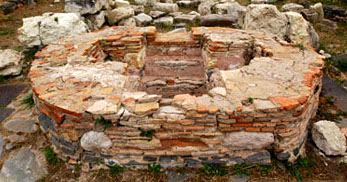 Cornus was an ancient town founded by the Carthaginians at the end of the 6th century BC on a preexisting nuragic settlement. It was situated about 2,5 km from the hamlet of Cuglieri named Santa Caterina di Pittinuri, on the hill of Corchinas, between the present areas of S’Archittu and Torre del Pozzo. The area was rich of natural resources, with rich soils, woods and minerals. It was the most important town of the Montiferru, and with its port it was also an important stopover in the routes that at the time coasted Sardinia .
Cornus was an ancient town founded by the Carthaginians at the end of the 6th century BC on a preexisting nuragic settlement. It was situated about 2,5 km from the hamlet of Cuglieri named Santa Caterina di Pittinuri, on the hill of Corchinas, between the present areas of S’Archittu and Torre del Pozzo. The area was rich of natural resources, with rich soils, woods and minerals. It was the most important town of the Montiferru, and with its port it was also an important stopover in the routes that at the time coasted Sardinia .
Cornus is famous for the Sardinian-Punic revolt of 215 BC against the Romans, leaded by Amsicora, who was from the town. In that period the Romans had defeated the Carthaginians and were preparing to conquer all the island, and Cornus was the town that fought most hard against the conquest: nevertheless, after two battles it was taken and became one of the most important roman towns of Sardinia. Later, during the high middle ages, it was one of the first towns of the island for the spread of Christianity. It changed its appearance and developed in two areas: the town inside the walls with towers, on the hill of Corchinas, and the Christian area outside the walls, that had spread after the creation of a funeral area in the 4th century in the area of Columbaris. At the beginning, in this portion a thermal structure seem to have existed, as it appeared during the excavations. First a basilica was built, and later a bigger structure, composed by another basilica, the baptistery and a building that was probably the episcopal palace. The seat of the diocese was ere according to the historians. The settlement was abandoned after the 10th century.
Today, the evidences of the Punic period are the ruins of the ancient walls, the graves and remains of material culture, whereas the roman age has left trails of the aqueduct, tombs, three epigraphs and two statues. The medieval era is shown by the three basilicas, the cemeterial one, the lithiurgical one and the baptistery.
© 2024 Sardegna in Tour website designed by Valentina Tolu





